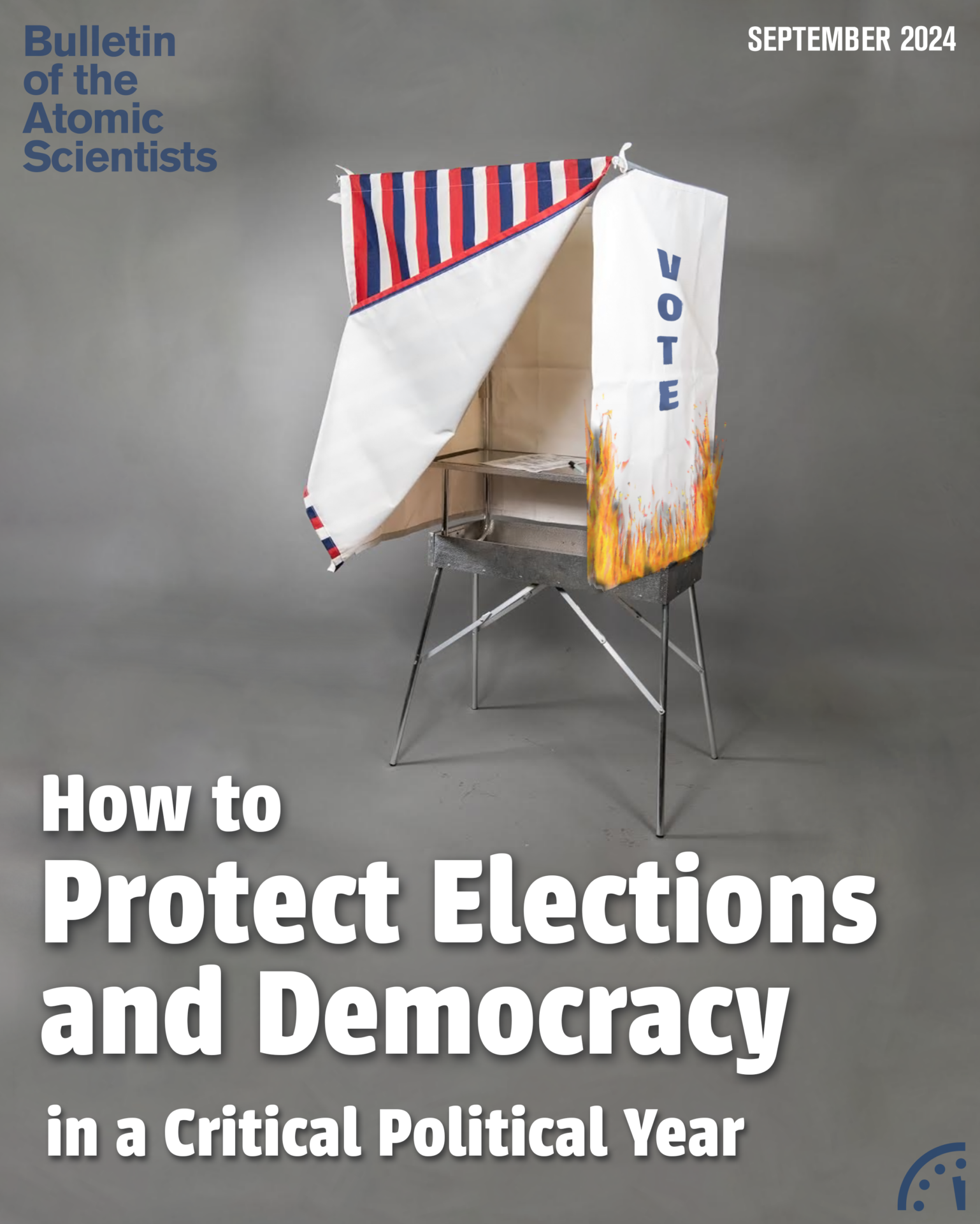Constitutional mistakes of the past can tyrannize the present—but we can fix them
By Lawrence Douglas | September 5, 2024
Constitutional mistakes of the past can tyrannize the present—but we can fix them
By Lawrence Douglas | September 5, 2024
The threat to democracy posed by former President Trump was exposed most glaringly in his response to his electoral defeat in 2020, when, for the first time in American history, a sitting president sought to subvert the peaceful transfer of power. In the years since, Trump has continued to lie about the election, insisting that a Democratic conspiracy rigged the result. He has also denied playing any role in instigating the storming of the Capitol on January 6, 2021, while praising the insurrectionists as patriots. And yet far from having paid a political or legal price for his reckless and arguably criminal attacks on American constitutional democracy, Trump has consolidated his power over the Republican party.
Trump has revealed how ill-equipped the US system is for dealing with a populist authoritarian. Consider how Brazil dealt with a similar challenge to its democratic process. In 2018, Jair Bolsonaro captured the Brazilian presidency. Like Trump, Bolsonaro rode a wave of populist discontent to his nation’s highest office, and his win was no less shocking than Trump’s had been two years earlier.
But by 2022, Bolsonaro had alienated enough Brazilians with his authoritarian bluster and botched response to COVID that he lost his re-election bid. Like Trump, Bolsonaro began attacking his country’s electoral system even before the voters had cast their votes. Bolsonaro insisted that the only way the system could prove its integrity is if he won; defeat would prove that the vote had been rigged. After his loss, Bolsonaro amplified his attacks on the electoral system, and on January 8, 2023, nearly two years to the day after the attack on the Capitol in Washington, D.C., thousands of Bolsonaro’s supporters stormed Brazil’s Congress, Supreme Court, and presidential offices, in an effort to restore their leader to office.
All this may sound eerily familiar, but here the similarities end. In June 2023, six months after the storming of the government buildings in Brasilia, Brazil’s Superior Electoral Court—a special body composed of seven judges—ruled that Bolsonaro had violated the nation’s election laws by defaming the integrity of the system. In a five-two decision, the court banned Bolsonaro from seeking public office until 2030, with the majority of Brazilians fully supporting the ruling.
The United States has no such oversight mechanism. In fact, for all its greatness and durability, the US Constitution, far from serving as an effective bulwark against democratic backsliding, is now contributing to the United States’ present political woes.
The problems with US democracy protections
Thanks to the historical peacefulness of US elections, the United States has been able to get by (so far) with exceptionally dated and vulnerable processes. As Samuel Issacharoff—an election law expert and professor at New York University—has observed, the United States is “alone among the world’s democracies,” in allowing “partisan officials … to be in charge of election administrations.” In the notorious election of 2000, in which George W. Bush captured the presidency by defeating Al Gore by a margin of 537 votes in Florida, the Florida secretary of state responsible for administering the election, Katherine Harris, was the co-chair of the Bush-Cheney state campaign, while the state’s attorney general, Bob Butterworth, was the chair of Gore’s Florida campaign.
Leaving the count in the hands of partisans is obviously unwise if for no other reason than it invites the kind of conspiracy theories and unrelenting claims of fraud that Trump specializes in—and that his loyalists accept, repeat, and act on.
While these attacks failed to stop Joe Biden from taking office in 2021, they have succeeded in other ways. Many of the election officials from both parties who performed admirably during the 2020 vote will not be presiding over the 2024 counts in many of the key swing states. Some of those who resisted Trump’s bogus claims of fraud in 2020 have been ousted by Republican-controlled state legislatures; others have resigned or left their positions because of intimidation and death threats tacitly, if not directly, condoned by Trump himself. A number of these posts are now occupied by Trump loyalists who alleged irregularities in 2020—despite a resounding lack of evidence.
The United States would benefit from the creation of an independent electoral tribunal empowered to adjudicate disputed presidential votes. At present, the body tasked with dealing with these disputes is Congress, the branch of government most riven by partisanship and dysfunction, largely as a consequence of the radicalization of the Republican Party. So while the 2020 election ran smoothly and produced a clear outcome, 147 Congressional Republicans—eight senators and 139 house members—voted on January 6, 2021 against certifying Biden’s victory. This astonishing vote came scant hours after Republican lawmakers had witnessed a violent attack on their own chamber by a mob egged on by Trump. At present, Republican congressional lawmakers cannot be trusted to preside over an electoral dispute. And yet removing Congress from its role in counting and accepting electoral votes would require a constitutional amendment, which brings us to a fresh set of problems standing in the way of any American democratic renewal—the Constitution itself.

Intersecting Constitutional defects
Chief among the defects of the Constitution is the US method of presidential elections. Unable to settle on a system for choosing a chief executive, the drafters of the Constitution ultimately borrowed from a device used by the Holy Roman Empire, in which prince-electors chose their monarchs and emperors.
Almost from the get-go, the Electoral College did not function as planned. Those who defend the Electoral College as a device designed to make sure the presidency isn’t always captured by what they term “coastal elites” offer a justification that has nothing to do with the college’s original design. Moreover, they ignore an obvious reality: The vast number of American citizens live in coastal states. An electoral scheme that, say, awarded eight votes to every citizen of Wyoming and a single vote to citizens of California would be dismissed as bizarre and transparently unfair. And yet, in effect, this is exactly what the Electoral College does. This anti-democratic system allows the loser of the national popular vote to capture the highest office in the land—an unseemly outcome that has already happened twice in the 21st century. The United States is alone among the world’s democracies in having a presidential election system that can produce such an outcome.
But while the Electoral College amplifies the voting power of citizens of states with small populations, it dramatically amplifies the power of citizens in a handful of swing states. In 2020, Biden won the national popular vote by a substantial margin—over 7 million votes. Yet his margin of victory in three key swing states—Arizona, Georgia, and Wisconsin—totaled a mere 44,000 votes. Such slim margins are a recipe for electoral chaos; that the nation managed to avoid a catastrophic electoral meltdown in 2000 (and also in 1876, when the Hayes-Tilden election produced a contested result) had less to do with the adequacy of the processes than it did with the character of those seeking higher office.
The election of 2020 was a different story.
It was no accident that Arizona, Georgia, and Wisconsin were Trump’s prime targets in his effort to overturn Biden’s victory. Had Trump succeeded in pressuring Georgia Secretary of State Brad Raffensperger to “find” (as Trump put it, using terms befitting a Godfather movie) the votes necessary to overcome Biden’s state lead; had Trump succeeded in his effort to submit bogus slates of electoral college votes from Arizona and Wisconsin—that is, had he succeeded in capturing the electoral college votes of these three states—the 2020 presidential election would have resulted in a tie.
In such a case, known as a “contingent election,” the Constitution tasks the House of Representatives with choosing the president from among the candidates who got the most Electoral College votes. But in another dramatic defect of constitutional design, each member of the House does not get to cast a vote. Rather, each House delegation gets a single vote.
In other words, Wyoming, with its 580,000 residents, would have the same power as California, with its 40 million residents, to elect the president. Had the 2020 vote resulted in an Electoral College tie, Trump would have recaptured the White House, because although Democrats still had a majority in the House, Republicans controlled more delegations.
This anti-democratic arrangement finds itself replicated in the structure of the Senate. As one may recall from high-school civics class, the Constitution accords each state two senators, regardless of population (thanks to another controversial compromise, worked out in 1787). In the early days of the Republic—when all states were essentially rural—population discrepancies from state to state were less dramatic, so the consequences of the apportionment scheme were less dire. Now, however, the system works to give white rural conservatives vastly disproportionate power over states with large urban multi-ethnic populations.
The dysfunctions of the Electoral College have worked in tandem with the anti-democratic structure of the Senate to produce a Supreme Court with an unprecedented demographic profile. Five of the six members of the conservative bloc that dominates the present Supreme Court were nominated by Republican presidents who lost the national popular vote (George W. Bush lost the popular vote in 2000 but won it in 2004) and were confirmed by a slim majority of senators representing states that fall far short of representing the majority of US voters.
Perhaps most disturbing from a small-d democratic point of view was this Republican-heavy Court’s recent 6-3 decision in Trump v. US, granting presidents wide-ranging immunity from criminal prosecution. The Court expressed great worry that without broad immunity, a future president might be so “enfeebled” by the possibility of being prosecuted after leaving office that he would be “chilled from taking the ‘bold and unhesitating action’ required of an independent Executive.” At the same time, the Court utterly ignored the danger that a former president, having already successfully dodged any legal reckoning for his attempt to subvert the results of fair democratic election, might now find himself back in the White House and, cloaked with the Court’s new blanket of immunity for all his so-called “official actions,” grossly abuses that power by targeting for prosecution the very people who tried to hold him to legal account.

The US system of governance offers few remedies to disastrous holdings by the Supreme Court. Because the Constitution appears to grant Justices life tenure—the matter of time limits isn’t crystal clear—citizens who hope to overturn such decisions must either wait a generation, hoping a new crop of Justices reconsiders the missteps of their predecessors, or they can try to overturn the decision by amending the Constitution. (For example, the heinous pro-slavery Dred Scott decision of 1857 was overturned by the 14th Amendment.)
But the latter course illustrates perhaps the most defective feature of the Constitution: Article V, the paragraph-long article that lays out the amendment process. Typically requiring the support of two-thirds of the members of each house of Congress and the assent of three-quarters of state legislatures, constitutional amendments are fiendishly difficult to pass. In his canonical comparative study, Donald Lutz, a political scientist who taught at the University of Houston, concluded that the US Constitution is the most difficult to amend of all the national constitutions in place across the globe.
A constitution should, of course, resist easy amendment—if too easily amendable, a constitution begins to look like an ordinary statute. And yet if a constitution is too hard to amend, then the constitutional mistakes of the past have the power to tyrannize the present. The fact that the antiquated and anti-democratic Electoral College is anchored in the US Constitution has utterly frustrated efforts to abolish or reform it. The first serious attempt to get rid of the Electoral College came in 1816; a noble effort nearly succeeded in the 1860s and then, again, a century later in the 1960s. But these attempts ultimately could not surmount the high bar that the Constitution erects for its own amendment. And compounding the problem, the amendment process itself cannot be amended except by constitutional amendment.
At least in the case of the Electoral College, frustration with the amendment process has led to a promising experiment. The National Popular Vote Interstate Compact represents a movement among states to award all state Electoral College votes to the winner of the national popular vote rather than the state popular vote. If states representing 270 Electoral College votes—the bare majority necessary to elect a president—sign on to the compact, the United States effectively will have a system of a national popular vote. So far, states representing 209 electoral votes have signed on to the compact, bringing the country within striking distance of a more democratic way of choosing our chief executive. And yet the problem remains: Even if the requisite number of states join, it’s unclear whether the compact would survive the inevitable constitutional challenge.
We Americans are reminded, then, that while Trump may pose the most persistent present threat to our democracy, the Constitution, far from offering a bulwark to this threat, has aided and abetted it. The Electoral College and the Senate work to amplify the voice of white, rural voters—the heart of MAGA support. This has directly led to the present composition of the Supreme Court, an institution that radically rejects many of the values shared by a majority of our urban-based, multi-ethnic nation. If Americans are to safeguard democracy, they cannot look only to the Constitution to do so. Much of that work must come from the body that the Constitution nominally claims as its author—we, the people. Citizens bear the responsibility of alerting themselves to the threats the nation faces and casting their ballots in a manner that answers and defuses those threats.
(Editor’s note: For more, see the previous October 28, 2020 Bulletin interview with Lawrence Douglas, titled “Should I stay or should I go? A ‘Chernobyl-like defect’ in our election system might give Trump a choice“)
.
Together, we make the world safer.
The Bulletin elevates expert voices above the noise. But as an independent nonprofit organization, our operations depend on the support of readers like you. Help us continue to deliver quality journalism that holds leaders accountable. Your support of our work at any level is important. In return, we promise our coverage will be understandable, influential, vigilant, solution-oriented, and fair-minded. Together we can make a difference.
Keywords: 2024 election, authoritarian threats, constitutional design, democracy, electoral system
Topics: Special Topics



















I am Catholic, and the Church teaches to vote for a pro life candidate. However, I in good conscience cannot support former President Trump. His promotion of violence, stirring discord, and use of profanity is not the behavior of a truly Christian President.
Excellent read. This writer needs to find a platform to shout this to the whole country. It would make a difference to those with an open mind.